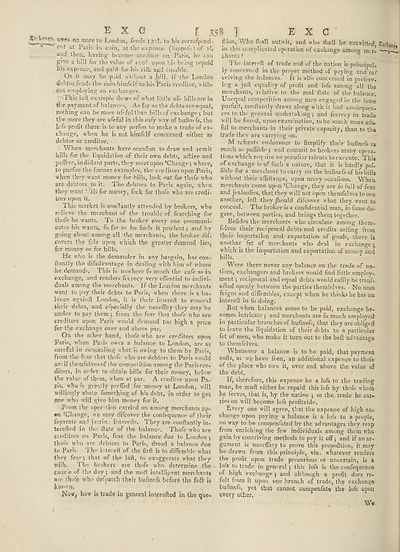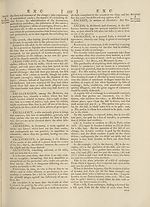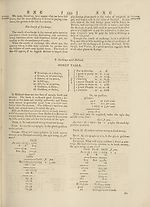Encyclopaedia Britannica, or, a Dictionary of arts, sciences, and miscellaneous literature : enlarged and improved. Illustrated with nearly six hundred engravings > Volume 8, ELE-FOR
(388) Page 358
Download files
Complete book:
Individual page:
Thumbnail gallery: Grid view | List view

e x c r .I-
ow«*s no more to London, fends laol. to his eorrefpond-
ent at Paris in coin, at the exponas (i’uppofe) of )!,
and then, having become creditor orj Paris, he can
give a bill for the value of i col upon his being repaid
bis expence, and pah! for his rilk apd trouble.
Or it may be p lid without a Ivil, if the London
debtor fends the coin himfelf to his Paris creditor, with*
. put employing an exchanger.
'■ l his laft example thews of what little ufe bills are in
ti e payment of balances. As far as the debts are equal,
nothing can be more uf ful than bills of exchange ; but
the more they are ufeful in this eafy way of bufim fs, the
lefs profit there is to any perfon to make a trade of ex¬
change, when he is not himfelf concerned either as
debtor or creditor.
When merchants have oceafion to draw and remit
hills for the liquidation of their own debts, active and
paffive, in didant parts, they meet upon ’Change; where,
to purfue the former examples, the creditors upon Paris,
when they want money for bills, look out for thofe who
are debtors to it. The debtors to Paris again, when
they want Tils for money, feck for thofe who are credi¬
tors upon it.
This market is eonflantly attended by brokers, who
relieve the merchant of the trouble of fearching for
thofe he wants. To the broker every one communi¬
cates bis wants, fo far as he finds it prudent; and by
going about among all the merchants, the broker dif-
covers the fide upon which the greater demand lies,
for money or for bills.
He who is the demander in any bargain, has eon-
itantly the djfadvantage in dealing with him of whom
he demands This is nowhere fo much the cafe as in
exchange, and renders fecrecy very effential to indivi¬
duals among the merchants. If the London merchants
want to pay their debts to Paris, when there is a ba¬
lance again!! London, it is their inter el! to conceal
,their debts, and cipecially the neceffity they may be
under to pay them ; from the fear that thofe who are
creditors upon Paris would demand too high a price
for the exchange over and above par.
On the other hand, thofe who are creditors upon
Paris, when Pads owes a balance to London, are as
careful in concealing what is owing to them by Paris,
from the fear that thofe who are debtors to Paris would
avail themfelves of the competition among the Pariscre-
dilors, in order to obtain bills for their money, below
the value of them, when at par, A creditor upon Pa.
fis, who is greatly p re fifed for money at London, will
willingly abate fomerhing of his debt, in order to get
one who will give him money for it,
From thr operation carried on among merchants up-
#n 'Change, we may difeover the confequenee of their
feparate and jurrin intereils. They are conftantly in-
terefted in the Hate of the balance, Thofe who are
creditors on Paris, fear the balance due to London ;
thofe who are debtors to Paris, dread a balance duo
to Paris, The Ltereft of the firft is to difiemble what
they fear; that of the laft, to exaggerate what they
Wjlh. The brokers are thofe who determine the -
tour e of the day ; and the moil intelligent merchants
are thofe. who defpatch their bufinefs before the faf! is
known,
IMow, how is trade in general interefted in the que-
8 1 E X C
ftion, Who {hall outwit, and who thall be outwitted Excl
in this complicated operation of exchange among nwr-
chants ?
The interefi of trade and of the nation is principal¬
ly concerned in the proper method of paying and re."
eeiving the balances. It is alio concerned in preferv-
irg a juil equality of profit and lofs among ^all the
merchants, relative to the real Hate of the balance.
Unequal competition among men engaged in the fame
purfuit, conftantly draws along with it bad confequen«
ces to the general undertaking ; and fecrecy in trade
will be found, upon examination, tube much more ufa.
ful to merchants in their private capacity, than to the
trade thev are carrying on.
M rchants endeavour to fimplify their bufinefs as
much as pofiible 5 and commit to brokers many opera,
tions which require no peculiar talents to execute. This
of exchange is of fuch a nature, that it is hardly pof.
fible for a merchant to carry on the bufinefs of his bills
without their a Hi ft a nee, upon many oeeafions. When
merchants come upon ’Change, they are fo full of fear
and jealoufies, that they will not open themfelves to one
another, left they ^hould difeover what they want to
conceal. The broker is a confidential man, in fume de¬
gree, between parties, and brings them together.
Befides the merchants who circulate among them-
felves their reciprocal debts and credits arifing from
their importation and exportation of goods, there is
another fet of merchants who deal in exchange;
which is the importation and exportation of money and
bills.
Were there never any balance on the trade of na¬
tions, exchangers and brokers would find little employ*
ment ; reciprocal and equal debts would eafily be tranf-
a£led openly between the parties themfelves. No man
feigns and diflembles, except when he thinks he has an
intereft in fo doing.
But when balances eome to be paid, exchange be¬
comes intricate ; and merchants are fo much employed
in particular branches of bufinefs, that they are obliged
to leave the liquidation of their debts to a particular
fet of men, who make it turn out to the heft advantage
to themfelves.
Whenever a balance is to be paid, that payment
cofts, as we have feen, an additional expence to thofe
of the place who owe it, over and above the value of
the debt,
If, therefore, this expenee be a lofs to the trading
man, he muft either be repaid this lofs by thofe whom
he ferves, that is, by the nation ; or the trade he caj>
ries on will become lefs profitable.
Every one will agree, that the expence of high ex«
change upon paying a balance is a lofs to a people,
no way to be compenfated by the advantages they reap
from enrichmg the few individuals among them who
gain by contriving methods to pay it off; and if an ar¬
gument is neceflary to prove this propofition? it may
be drawn from this principle, vi«, whatever renders
the profit upon trade precarious or uncertain, is a
lo's to trade in general; this lofa is the confequenc©
of high exchange ; and although a profit does re-
lult bom it upon one branch of trade, the exchango
bufineL, yet that cannot compenfate the lofs upon
every other.
We
ow«*s no more to London, fends laol. to his eorrefpond-
ent at Paris in coin, at the exponas (i’uppofe) of )!,
and then, having become creditor orj Paris, he can
give a bill for the value of i col upon his being repaid
bis expence, and pah! for his rilk apd trouble.
Or it may be p lid without a Ivil, if the London
debtor fends the coin himfelf to his Paris creditor, with*
. put employing an exchanger.
'■ l his laft example thews of what little ufe bills are in
ti e payment of balances. As far as the debts are equal,
nothing can be more uf ful than bills of exchange ; but
the more they are ufeful in this eafy way of bufim fs, the
lefs profit there is to any perfon to make a trade of ex¬
change, when he is not himfelf concerned either as
debtor or creditor.
When merchants have oceafion to draw and remit
hills for the liquidation of their own debts, active and
paffive, in didant parts, they meet upon ’Change; where,
to purfue the former examples, the creditors upon Paris,
when they want money for bills, look out for thofe who
are debtors to it. The debtors to Paris again, when
they want Tils for money, feck for thofe who are credi¬
tors upon it.
This market is eonflantly attended by brokers, who
relieve the merchant of the trouble of fearching for
thofe he wants. To the broker every one communi¬
cates bis wants, fo far as he finds it prudent; and by
going about among all the merchants, the broker dif-
covers the fide upon which the greater demand lies,
for money or for bills.
He who is the demander in any bargain, has eon-
itantly the djfadvantage in dealing with him of whom
he demands This is nowhere fo much the cafe as in
exchange, and renders fecrecy very effential to indivi¬
duals among the merchants. If the London merchants
want to pay their debts to Paris, when there is a ba¬
lance again!! London, it is their inter el! to conceal
,their debts, and cipecially the neceffity they may be
under to pay them ; from the fear that thofe who are
creditors upon Paris would demand too high a price
for the exchange over and above par.
On the other hand, thofe who are creditors upon
Paris, when Pads owes a balance to London, are as
careful in concealing what is owing to them by Paris,
from the fear that thofe who are debtors to Paris would
avail themfelves of the competition among the Pariscre-
dilors, in order to obtain bills for their money, below
the value of them, when at par, A creditor upon Pa.
fis, who is greatly p re fifed for money at London, will
willingly abate fomerhing of his debt, in order to get
one who will give him money for it,
From thr operation carried on among merchants up-
#n 'Change, we may difeover the confequenee of their
feparate and jurrin intereils. They are conftantly in-
terefted in the Hate of the balance, Thofe who are
creditors on Paris, fear the balance due to London ;
thofe who are debtors to Paris, dread a balance duo
to Paris, The Ltereft of the firft is to difiemble what
they fear; that of the laft, to exaggerate what they
Wjlh. The brokers are thofe who determine the -
tour e of the day ; and the moil intelligent merchants
are thofe. who defpatch their bufinefs before the faf! is
known,
IMow, how is trade in general interefted in the que-
8 1 E X C
ftion, Who {hall outwit, and who thall be outwitted Excl
in this complicated operation of exchange among nwr-
chants ?
The interefi of trade and of the nation is principal¬
ly concerned in the proper method of paying and re."
eeiving the balances. It is alio concerned in preferv-
irg a juil equality of profit and lofs among ^all the
merchants, relative to the real Hate of the balance.
Unequal competition among men engaged in the fame
purfuit, conftantly draws along with it bad confequen«
ces to the general undertaking ; and fecrecy in trade
will be found, upon examination, tube much more ufa.
ful to merchants in their private capacity, than to the
trade thev are carrying on.
M rchants endeavour to fimplify their bufinefs as
much as pofiible 5 and commit to brokers many opera,
tions which require no peculiar talents to execute. This
of exchange is of fuch a nature, that it is hardly pof.
fible for a merchant to carry on the bufinefs of his bills
without their a Hi ft a nee, upon many oeeafions. When
merchants come upon ’Change, they are fo full of fear
and jealoufies, that they will not open themfelves to one
another, left they ^hould difeover what they want to
conceal. The broker is a confidential man, in fume de¬
gree, between parties, and brings them together.
Befides the merchants who circulate among them-
felves their reciprocal debts and credits arifing from
their importation and exportation of goods, there is
another fet of merchants who deal in exchange;
which is the importation and exportation of money and
bills.
Were there never any balance on the trade of na¬
tions, exchangers and brokers would find little employ*
ment ; reciprocal and equal debts would eafily be tranf-
a£led openly between the parties themfelves. No man
feigns and diflembles, except when he thinks he has an
intereft in fo doing.
But when balances eome to be paid, exchange be¬
comes intricate ; and merchants are fo much employed
in particular branches of bufinefs, that they are obliged
to leave the liquidation of their debts to a particular
fet of men, who make it turn out to the heft advantage
to themfelves.
Whenever a balance is to be paid, that payment
cofts, as we have feen, an additional expence to thofe
of the place who owe it, over and above the value of
the debt,
If, therefore, this expenee be a lofs to the trading
man, he muft either be repaid this lofs by thofe whom
he ferves, that is, by the nation ; or the trade he caj>
ries on will become lefs profitable.
Every one will agree, that the expence of high ex«
change upon paying a balance is a lofs to a people,
no way to be compenfated by the advantages they reap
from enrichmg the few individuals among them who
gain by contriving methods to pay it off; and if an ar¬
gument is neceflary to prove this propofition? it may
be drawn from this principle, vi«, whatever renders
the profit upon trade precarious or uncertain, is a
lo's to trade in general; this lofa is the confequenc©
of high exchange ; and although a profit does re-
lult bom it upon one branch of trade, the exchango
bufineL, yet that cannot compenfate the lofs upon
every other.
We
Set display mode to:
![]() Universal Viewer |
Universal Viewer | ![]() Mirador |
Large image | Transcription
Mirador |
Large image | Transcription
Images and transcriptions on this page, including medium image downloads, may be used under the Creative Commons Attribution 4.0 International Licence unless otherwise stated. ![]()
| Permanent URL | https://digital.nls.uk/192268463 |
|---|
| Attribution and copyright: |
|
|---|
| Description | Ten editions of 'Encyclopaedia Britannica', issued from 1768-1903, in 231 volumes. Originally issued in 100 weekly parts (3 volumes) between 1768 and 1771 by publishers: Colin Macfarquhar and Andrew Bell (Edinburgh); editor: William Smellie: engraver: Andrew Bell. Expanded editions in the 19th century featured more volumes and contributions from leading experts in their fields. Managed and published in Edinburgh up to the 9th edition (25 volumes, from 1875-1889); the 10th edition (1902-1903) re-issued the 9th edition, with 11 supplementary volumes. |
|---|---|
| Additional NLS resources: |
|

